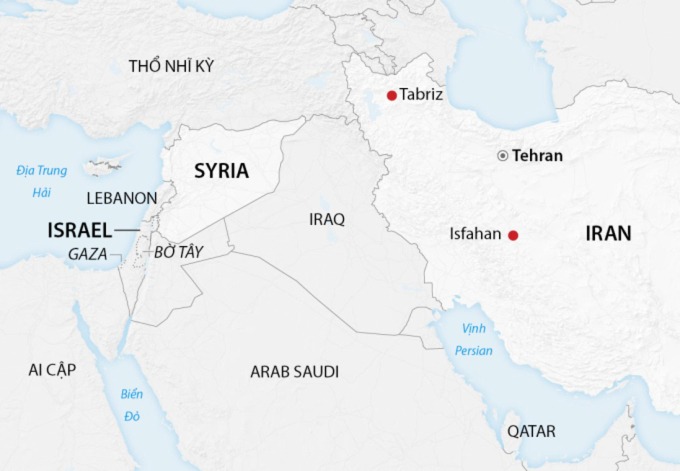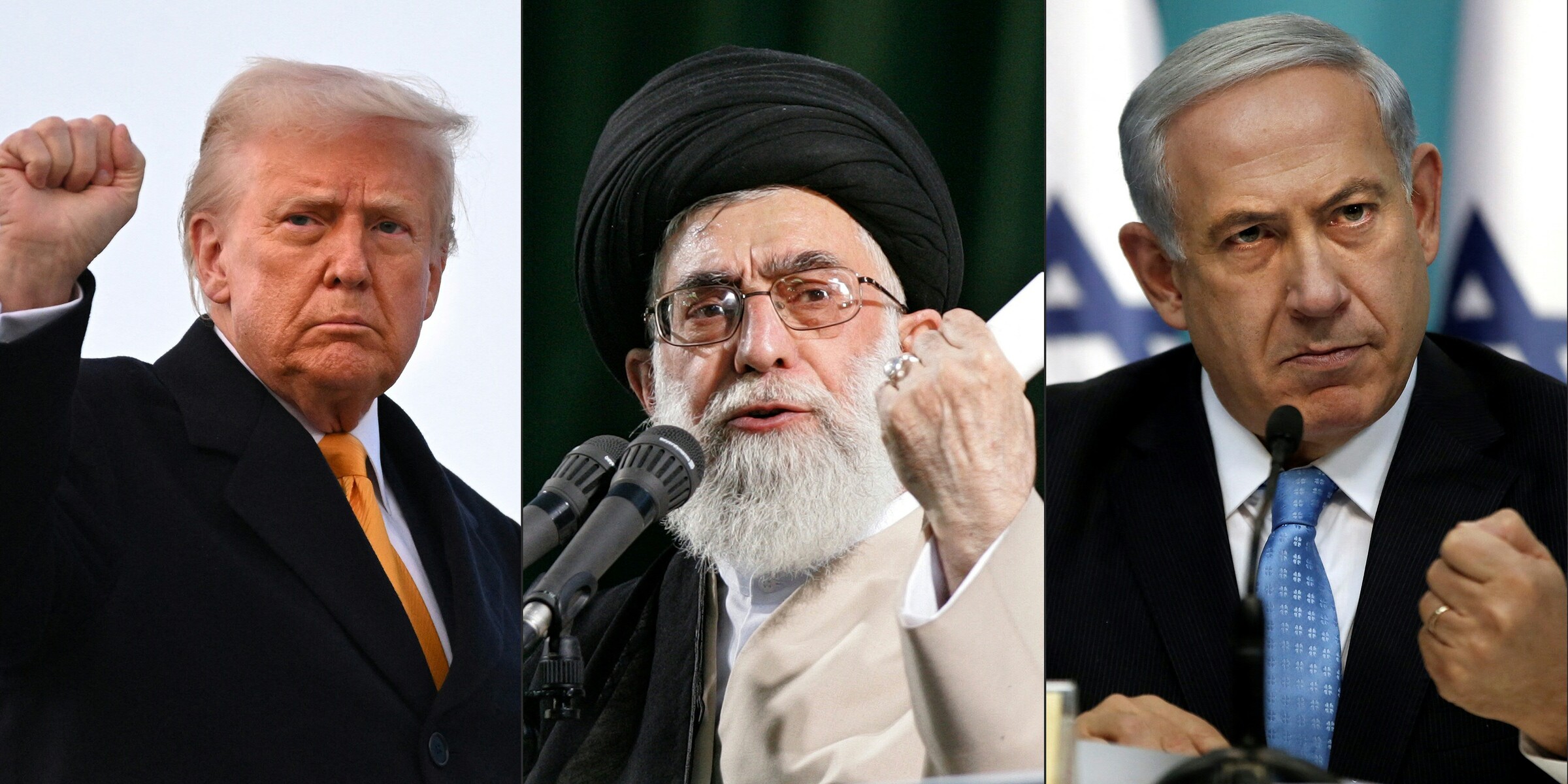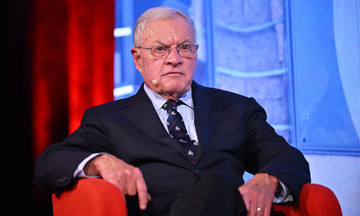Israel and Iran agreed to a ceasefire on 24/6, brokered by the US and Qatar, ending 12 days of conflict that resulted in significant casualties and damage for both sides. The situation remains generally stable, despite mutual accusations of violations and threats of retaliation.
Arab nations view the conflict as a setback, pulling the region back into division and confrontation. This contrasts with the push for cooperation and prosperity that US President Donald Trump advocated during his visit to the Gulf last month.
"Israel prioritizes a hardline approach while everyone else is trying to build bridges," Mohamed Baharoon, director of the b'huth policy center in the United Arab Emirates (UAE), told the Christian Science Monitor. "People will be asking: Is the idea of a shared space where we can coexist without fighting even viable anymore?"
 |
A sign displaying the leaders of the US, Israel, Saudi Arabia, Syria, Oman, and Lebanon with the slogan "New Opportunities for a New Middle East" in Tel Aviv, Israel on 26/6. Photo: AFP |
A sign displaying the leaders of the US, Israel, Saudi Arabia, Syria, Oman, and Lebanon with the slogan "New Opportunities for a New Middle East" in Tel Aviv, Israel on 26/6. Photo: AFP
Israel has long considered Iran its arch-enemy in the Middle East. Tehran has repeatedly called for "wiping Tel Aviv off the map," while Israel views Iran's nuclear program as an existential threat.
Arab nations, predominantly Sunni Muslim, also view Shiite Iran as a rival. Iran's support for armed groups in the Middle East, such as Hamas, Hezbollah, and the Houthis, along with its missile capabilities that cover the region, has raised concerns and prompted some Arab nations to cooperate with Israel.
The conflict between Israel and Iran is changing this trend. Israel's military and intelligence operations targeting Iran and Hezbollah are causing unease among many Arab nations. They fear that Israel might act unilaterally, beyond their control and against their interests.
"Military success has put Israel in a difficult position," said US Representative Zach Nunn, a Republican, after meeting with leaders from Saudi Arabia, the UAE, and Bahrain during a recent trip to the Middle East.
Gulf states have witnessed Israel's military capabilities and want Tel Aviv to commit to responsible action. "There are a lot of fault lines in the region. If you choose to use a hammer, everything will break," said Anwar Gargash, the UAE's diplomatic advisor.
 |
The Middle East. Graphic: CNN |
The Middle East. Graphic: CNN
Saudi Arabia was on the verge of joining the Abraham Accords, the US-brokered diplomatic agreement recognizing Israel. Such a move would have strengthened Israel's relations with the Arab world and opened doors for wider acceptance in the region. The UAE, Bahrain, Sudan, and Morocco have already signed the accords.
Riyadh will now likely take more time to assess the situation, having witnessed Tel Aviv's display of military and intelligence power and its willingness to take risks in operations, the Wall Street Journal commented.
"Establishing diplomatic relations with Israel requires a lot of effort. Now is not the right time," a Saudi official said. "The pressing issue is the Palestinian state, not the threat from Iran."
Saudi Arabia has stated it will not join the Abraham Accords until the fighting in Gaza between Israel and Hamas ends. Riyadh insists on a credible path toward the establishment of a Palestinian state to address the root cause of the conflict, something Tel Aviv firmly rejects.
Other Arab countries, like Jordan and Egypt, have chosen a cautious and balanced response, despite having normalized relations with Israel. Jordan joined 20 other Arab nations in condemning Israel's attacks on Iran but also participated in intercepting missiles and UAVs launched by Tehran over its airspace in retaliation against Tel Aviv.
Egypt welcomed the Israel-Iran ceasefire and announced its continued diplomatic efforts to find a lasting solution to the regional crises. However, Cairo firmly rejected any plans from Washington or Tel Aviv that could lead to Egypt accepting displaced Palestinians from Gaza.
"The Egyptian government also does everything to avoid antagonizing Israel and the US. For example, they blocked a march from Tunisia in support of Gaza on 14/6," Simon Wolfgang Fuchs, associate professor of Islamic Studies at the Hebrew University of Jerusalem, told DW, noting Cairo's significant dependence on US military aid.
 |
From left, US President Donald Trump, Iranian Supreme Leader Ali Khamenei, and Israeli Prime Minister Benjamin Netanyahu. Photo: AFP |
From left, US President Donald Trump, Iranian Supreme Leader Ali Khamenei, and Israeli Prime Minister Benjamin Netanyahu. Photo: AFP
At the same time, Iran's neighbors understand the importance of maintaining a regional balance of power. They are content to see Iran's power diminished but do not desire chaos within the country.
"The threat from Iran is not what it used to be. Arab countries see a weakened rival but still acknowledge Iran's important role. They have no interest in further destabilizing the current Iranian government, let alone changing it, as that would only lead to chaos," Fuchs said.
"It's unpredictable what a country will do when it is cornered and fighting for its survival," commented Marcus Schneider, project manager for Middle East peace and security at the Friedrich Ebert Foundation, an independent political organization in Germany.
Nhu Tam (According to WSJ, DW)












